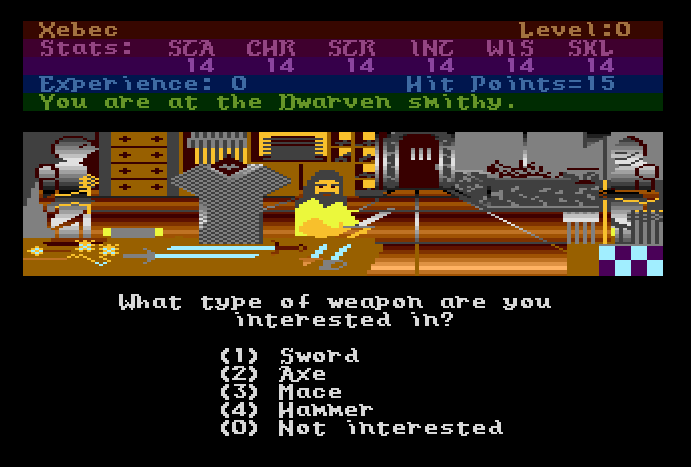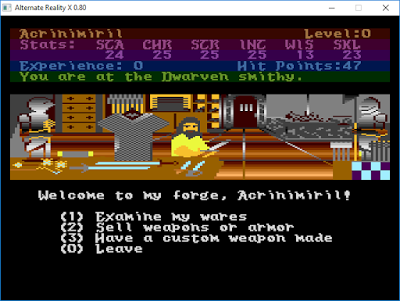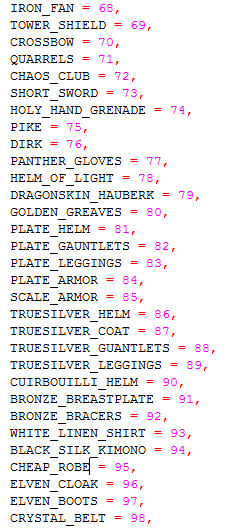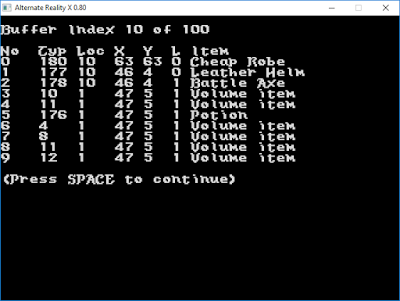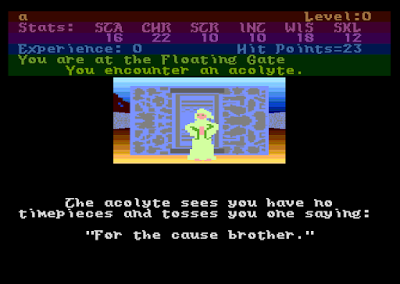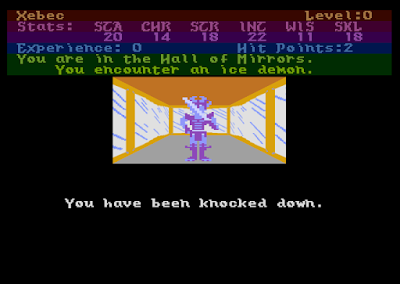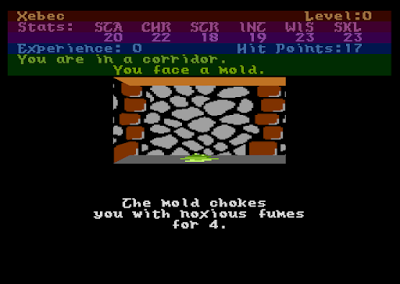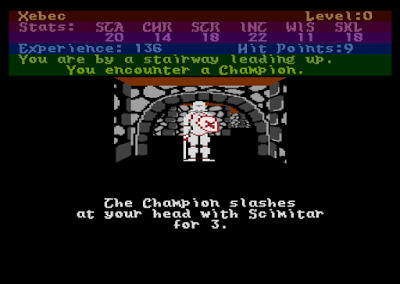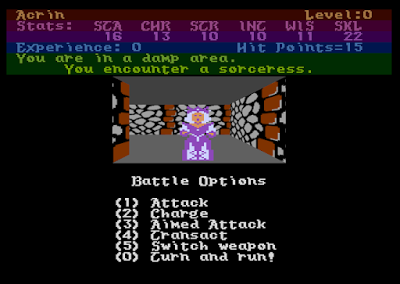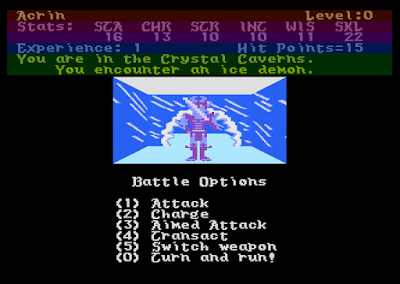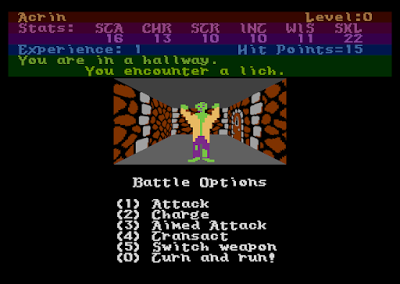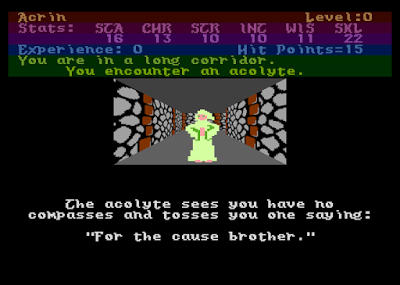Every so often I receive an email or a post complaining that I’ve done something “wrong” with my remake of Alternate Reality:The City and the Dungeon – I’m not talking about bug reports or unimplemented features but more about design decisions. I guess in some cases I’m not making the decisions they would make if they were remaking Alternate Reality. For everyone who thinks I’m not expanding the game enough someone else thinks it’s not faithful enough. I think I’m past the point where this bothers me now and I’m realistic enough to know that with a project like this you’ll never please everybody. Most ARX players have been incredibly positive and supportive (and not to mention patient). Their feedback is also constructive, useful and essential to developing my project further. So I’ll take this opportunity to say thanks 🙂
I thought I would talk about some of the design choices I’ve made with Alternate Reality X, the challenges I’ve dealt with and why these are unique to the Alternate Reality series of games (released and planned). Looking back now I think Alternate Reality was always going to be one of the most difficult and complicated games to remake in comparison to the other CRPGs from the same time period. I’ll explain below why I think that’s the case.
I started what I now call Alternate Reality X way back in 2009. I’ve had breaks during those years and diversions where I’ve looked into other formats or technologies but I’m now settled on the current technology so to speak in terms of using SFML and C/C++. I’d played around with Alternate Reality before but this is the year I made the first iteration of what you see today.
My background with Alternate Reality began with the Dungeon which I received as a Christmas present one year for my Commodore 64. Once I’d managed to keep a character alive long enough to advance a couple of experience levels, obtained some better equipment and stumbled across a quest I was hooked and played it regularly until I carelessly wrote over the Dungeon game disk years later in my haste to create a new character disk. I still have the box, map and manual today.
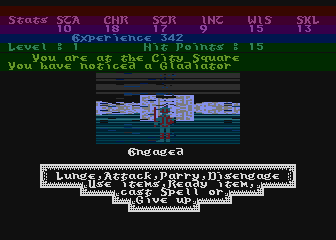
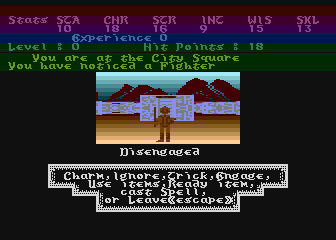
When I got access to the internet (around 1995) one of the first things I found was The Original Alternate Reality Homepage at: http://www.eobet.com/alternate-reality/ (it had a different URL back then). This site had lots of information about the games, an extensive FAQ, screenshots, maps (below) and comments from the AR developers including Philip Price. It also led me to the AR Mailing List (which sadly now seems to be offline) which was a great source of information. I’d never played any version of the City though I was aware of it from magazine reviews I’d read back in the 1980s.

One of my early goals with Alternate Reality X was to allow the player to move seamlessly between the City and the Dungeon as originally envisaged by Philip Price.
Whilst they share many similarities the City and Dungeon scenarios are very different games in my opinion. Perhaps the biggest difference is in the combat system. The City has the concept of engaged and disengaged menus (pictured above) but this was replaced by a different system in the Dungeon consisting of options for surprising an encounter, Battle Options and a Transact menu. This was the system I opted for in ARX.
Many other elements are different between the two scenarios from encounter graphics and map style to the use of currency. I don’t think ARX feels like a totally consistent game yet but hopefully as I add features the two scenarios will feel more integrated.
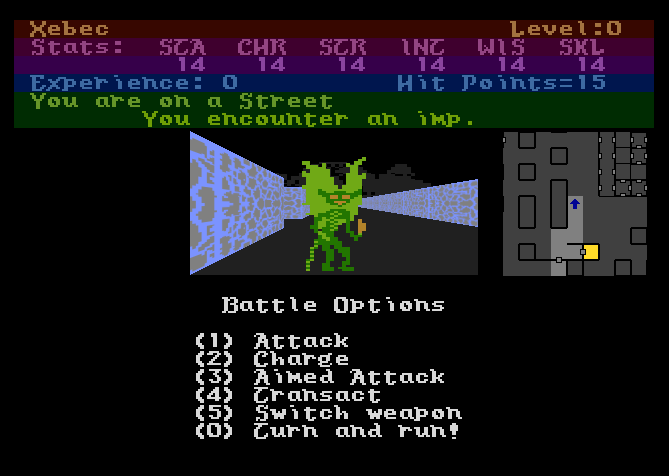
I made a number of development decisions which I’ll try to summarise here:
- Players can move freely between the City map and the first level of the Dungeon as I imagine was originally intended by Philip Price.
- I removed the penalties for saving characters in both the City and the Dungeon and provided 10 save game slots.
- I removed timing from combat – I might add it back in as an option in the future – if there is demand for it.
- Guilds are set up with multiple “branches” in the City and Dungeon and guild bonuses can be picked up in the Dungeon as well as the City (providing a guild has a location in the Dungeon).
- 8bit Dungeon-style guilds are used rather than the style that was added to the 16bit versions of the City.
- I chose to use the Dungeon’s combat system and menus rather than the City’s engaged / disengaged menus.
- I liked the Charm and Trick mechanics of the City and added them to the ARX Transact menu.
- The City’s potion system (tasting, sipping etc) where you tried to identify one of over 50 potions was not present in the Dungeon but I liked it so have added it into ARX.
- As the encounter graphics are very different in style and size I opted to use the Dungeon’s encounter graphics for better consistency between the two scenarios.
- I expanded the City’s map format to use the Dungeon format which used more bytes to allow more wall and door types and a “special” byte for fixed encounters, messages and unique treasures.
- The City used a degree of randomisation when creating monster stats but I opted for the Dungeon’s fixed stats. I did originally generate encounters differently between the two scenarios but I felt it would always make the game feel disjointed and inconsistent if for example an encounter with a thief in the City felt very different to one in the Dungeon.
- The economy – there’s a big divide here with the City trading in coppers (running into the 10,000s) and the Dungeon using silver, gems and jewels. I’ve kept the original prices and currency for now but it’s very inconsistent and I’m not really happy with it.
- Again for consistency I’ve for now settled on a single font (the Dungeon) and banner colour scheme (the City). Easily changed in the future if required.
Other considerations:
- I’m not a professional programmer so I’ve reworked and refined code a lot and will continue to do so until the project is complete. In addition I’ve not always understood the longer term requirements for a feature until further down the line (e.g. custom objects created dynamically in game).
- The Arena, Palace, Wilderness, Revelation and Destiny scenarios were never completed.
- A variety of different versions of the game(s) exist across 8bit and 16bit platforms, many of which add further variety in terms of graphics, music and mechanics.
- Less of a problem in the Dungeon but there are many areas of the City where features and locations were left for later patching.
- There’s always the question of making the game authentic (in look and feel) versus an “upgrade” with better graphics and sound as well as new features.
- Should I have treated the City and the Dungeon as two separate games with a compatible character save file? I even thought of developing them as two separate executables (or sets of datafiles).
- I can possibly address some of the differences as game options and preferences but that does add to further development time. I’m considering this though 🙂
I cannot think of a single game or series of games that would have presented quite so many questions or difficult decisions as Alternate Reality. There are no right answers for many of these If you have a game or series of games in mind though please let me know as I’d love to hear about it.
In the meantime if you have an opinion about any of the above or a design preference I’m interested to hear it. Nothing in ARX is set in stone.

